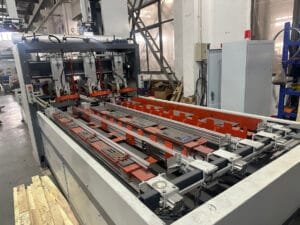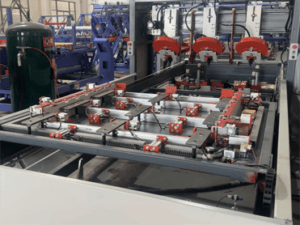Plastic roof tiles are transforming the roofing industry with their eco-friendly composition, durability, and versatility. Made from recycled plastics, these tiles offer a sustainable alternative to traditional materials like clay, concrete, and slate. In this comprehensive guide, we’ll explore the raw materials, features, manufacturing processes, market demand, production techniques, and equipment behind plastic roof tiles, featuring insights from leading producers like Brava Roof Tile, Amabo, and EcoTiles. We’ll also highlight how advanced machinery, such as the plastic molding machine from PalletsBiz and PresswoodMachine, can enhance production efficiency for businesses entering this growing market.
Raw Materials for Plastic Roof Tiles
The foundation of plastic roof tiles lies in recycled plastics, typically sourced from post-consumer waste like polyethylene (PE) and polypropylene (PP). This not only reduces landfill burden but also promotes a circular economy. Key manufacturers enhance their products with unique additives:
- Brava Roof Tile (https://www.bravarooftile.com) uses 100% recycled plastic combined with sustainable materials to improve strength and fire resistance. Learn more about their product here.
- Amabo (https://amabo.cm) blends recycled plastic with sand to create a robust, heat-resistant composite suitable for tropical environments. Check out their approach here.
- EcoTiles (https://plasticsmartcities.org/ecotiles) incorporates recycled plastics with sand and UV-stabilizing pigments, ensuring longevity under harsh sunlight. Explore their eco-friendly tiles here.
These materials are abundant, cost-effective, and environmentally responsible, making recycled plastic roof tiles a standout choice for sustainable construction.
Key Features of Plastic Roof Tiles
Plastic roof tile products offer a compelling mix of functionality and aesthetics, distinguishing them from conventional roofing options:
- Sustainability: Crafted from recycled materials and often fully recyclable, they minimize environmental impact. For instance, EcoTiles repurposes 1.5 tons of plastic waste per three-bedroom house.
- Durability: Resistant to UV rays, impact, and extreme weather, these tiles provide long-lasting performance.
- Lightweight Design: Weighing up to 50% less than clay or concrete, they reduce structural strain and shipping costs.
- Aesthetic Versatility: Designs mimic natural materials like slate or cedar shakes, as seen in Brava Roof Tile’s offerings, with customizable colors and textures.
- Weather Resistance: Enhanced with additives, they achieve high fire ratings (e.g., Brava’s Class A or C) and excellent insulation.
- Cost-Effectiveness: Priced competitively—around $1 per tile for EcoTiles—they appeal to a wide audience.
These attributes make durable plastic roof tiles ideal for homeowners and builders seeking eco-friendly plastic roof tiles that balance style and resilience.
Manufacturing Process of Plastic Roof Tiles
The production of plastic roof tiles combines recycling technology with precision molding:
- Collection and Sorting: Waste plastic is collected, sorted by type, and cleaned.
- Shredding: A plastic recycling machine processes the plastic into granules or flakes.
- Blending: Granules are mixed with additives like sand or UV stabilizers to form a composite.
- Molding: The mixture is melted and shaped using a plastic molding machine or plastic roof tile machine.
- Cooling and Finishing: Tiles are cooled, trimmed, and tested for quality.
This efficient process is employed by companies like Amabo (https://amabo.cm) and EcoTiles (https://plasticsmartcities.org/ecotiles), ensuring high-quality plastic roof tile production.
Market Demand for Plastic Roof Tiles
The demand for plastic roof tiles is on the rise, driven by key factors:
- Environmental Focus: Initiatives like those from Plasticsmartcities.org (https://plasticsmartcities.org/ecotiles) emphasize reducing plastic waste, boosting interest in recycled plastic roof tiles.
- Construction Growth: Rapid urbanization in regions like Africa, where Amabo operates, increases the need for affordable, durable roofing.
- Climate Adaptability: Weather-resistant plastic roof tiles excel in extreme conditions, from tropical heat to stormy climates.
- Affordability: Cost-effective options appeal to builders and homeowners, enhancing the popularity of plastic roof tile products.
The green roofing market is projected to grow at a CAGR of over 10% through 2030, with sustainable plastic roof tiles at the forefront.
Production Equipment for Plastic Roof Tiles
Efficient production hinges on advanced machinery:
- Plastic Recycling Machine: Converts waste plastic into usable granules.
- Plastic Molding Machine: Shapes the composite into precise tiles.
- Plastic Roof Tile Machine: Specialized for roofing-specific designs.
- Plastic Pallet Molding Machine: Produces complementary roofing components.
For businesses looking to optimize plastic roof tile production, PalletsBiz (https://palletsbiz.com) and PresswoodMachine (https://presswoodmachine.com) offer a standout plastic molding machine. This equipment produces multiple tiles per cycle, delivering exceptional efficiency. They also provide customizable tile designs to meet unique client demands, such as replicating slate or barrel styles. Their full production line—from plastic recycling machines to molding, mold design, installation, and debugging—offers a comprehensive solution for manufacturers of custom plastic roof tiles.
Why Choose Plastic Roof Tiles?
Plastic roof tiles blend sustainability with practicality. Unlike traditional materials that deplete natural resources, they transform waste into long-lasting roofing solutions. Their lightweight nature simplifies installation, while their durability suits diverse climates—think Amabo’s tropical resilience or Brava Roof Tile’s aesthetic appeal (https://www.bravarooftile.com).
For producers, partnering with suppliers like PalletsBiz (https://palletsbiz.com) and PresswoodMachine (https://presswoodmachine.com) enhances capabilities. Their plastic roof tile machine streamlines production, while their tailored services cater to markets seeking eco-friendly plastic roof tiles or durable plastic roofing solutions.
Conclusion
Plastic roof tiles are redefining roofing with their recycled origins, impressive features, and rising market demand. Industry leaders like Brava Roof Tile (https://www.bravarooftile.com), with products detailed here, Amabo (https://amabo.cm), showcased here, and EcoTiles (https://plasticsmartcities.org/ecotiles), featured here, exemplify innovation in this space. For manufacturers, equipping operations with a plastic molding machine from PalletsBiz (https://palletsbiz.com) and PresswoodMachine (https://presswoodmachine.com) ensures high-quality, efficient plastic roof tile production. Ready to lead in sustainable roofing? Contact PalletsBiz and PresswoodMachine today for customized, end-to-end solutions.



